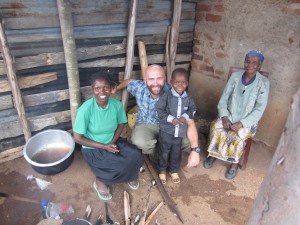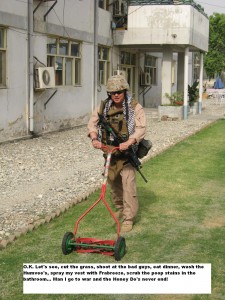Eliza’s house
March 4th, 2015 Posted in The SandGram v1.0Dear friends and family,
At dawn this morning Jake and I set out to Eliza’s house. The main road that leads out to the valley where she lives was bustling with families on their way to church and motorcycle taxi drivers and cows being moved along slowly by boys with sticks. It was a 7 mile hike in a light rain through lush hill country. Eliza is a Nuru Kenya employee in our Social Enterprise program and earlier this week she asked Jake and I if we would join her family for a Sunday meal. “Of course,” Jake told her with his sincere West Virginia smile. “It’s important to visit our employees in their homes and get to know them personally,” he told me later, “it’s a key foundation of the servant leadership we practice here at Nuru.” On the walk to her house Jake told me her story. Eliza had grown up here in Kuria as all people from Kuria grow up – in extreme poverty. Eliza worked hard in school and showed great promise but her mother needed her help in the house after her father died, and so at 10 Eliza did what a vast majority of 10 year old girls do out here – she left school and became a caretaker to her own mother and to her two younger sisters and two younger brothers. She carried water to the house each day and sewed old clothes and cleaned and helped in the shamba. As a young teenager Eliza was married off to a raging alcoholic, abusive, animal of a man. They had four children. He would soon lose his job as a school teacher on account of his alcoholism. Eliza knew only she could feed her family and so she opened up a sewing business in her home, and then borrowed money to open up a small convenience store. And then she met Nuru. She came aboard as a field officer and quickly rose through the ranks. She now serves as one of Nuru’s best performing Field Officers and daily manages dozens of people with incredible success by means of a tough, compassionate style of leadership. Eliza’s husband died last year. She still works for Nuru, runs her sewing business, farms a two-acre plot of land, and raises 4 children ages 4, 6, 8 and 10. Eliza is pictured in the attached photograph with me, her mama, and one of her sons, Geoffrey, who is in his Sunday’s best for our visit. She cooked us a meal of chicken (which was boiled in a pot with feet and head still attached), rice, vegetables and tea. We sat in a small, dark room in her home and ate the humble feast. Eliza loved Jake and they talked about the earlier days of Nuru. Jake asked her if she would be hungry this season because of the Maize disease and the drought. She said, quietly, but assuredly, “my family will be ok.” And with little Geoffrey in her lap happily eating from his mom’s bowl of rice, she looked down smiled, and said they serve porridge at school for breakfast and lunch to the children whose parents pay a fee, and since she had saved prior and payed the school, her children would eat. She would have enough maize to feed them for dinners. And then she looked at me and said her family blessed and that Nuru was a “miracle from God.” Soon it was time to leave and we exchanged warm hugs and I thought about how much hard life Eliza had seen in her 32 years as we made our way back down the road and into the valley and back into town that was still full of church goers and motorcycle taxis and cows being moved along slowly by boys with sticks.
Observations. (1.) The ex-pat Nuru Team here are some incredible, talented young people. They possess a Marine’s dedication and a warrior’s heart. They are deeply passionate about their role in fighting extreme poverty. They are extremely smart, low maintenance, and funny. They are world-patriots and tough. Getting to know them personally this past month has been deeply satisfying – not only to the existential end that I have realized how much we all have in common but also to the quite selfish end that since they are all such talented field operators, my job here will be much less challenging and our hopes for success much, much greater. As always, I find myself in the very fortunate position of leading a team of people much, much better and more qualified than myself. Thank God for that! (2.) The people of Kuria are, first, a beautiful people. They have high cheekbones and soft, kind eyes and bright, black skin. They are, second, a soulful people. They sing loudly in church and greet you happily in their valleys. They like to dance and laugh. Most have never left their villages. They are more sure about the absoluteness of God and the truth of the gospel than the are about the mystic, incomprehensible ocean. Their world is that rich land which surrounds them and there is something deeply romantic about that. The center of their universe is their family and their friends. The life expectancy for a Kurian man is 42. A Kurian woman isn’t much more. And so they are, finally, a grateful and deliberate people who live life as deeply as they can while they are here. There’s much to learn from them. (3.) It’s only been a month here on project but I already feel that being here will have an enormous impact on my heart and consciousness. War leaves us better and worse. But this feels much different. Our new war. (4.) I listen to the radio online when I can. I like to tune into the TED radio hour, or some such other program, and stare at my ceiling as the hard rain pound our tin roof. I escape in that radio hour. As I listen, my mind races to keep up with the story….I realize my imagination has atrophied. I think about my grandparents generation and I miss a radio-listening culture that I never knew. (5.) Hemingway once wrote: “Going back to Africa after all this time, there’s an excitement of a first adventure. I love Africa and I feel it’s another home, and any time a man can feel that, not counting where he’s born, is where he’s meant to go.” I agree.
It’s raining now. I heard thunder and so I stepped outside and saw crisp white lightening sparkle and dance in a wine dark sky. I came back inside, wet. I’m listening to an old John Prine album. Tomorrow I’ll walk through the shambas and watch the farmers tend to their tobacco, beans, and chilis. And it will be a perfect day.
Here’s to Eliza, and family and friends, and laughing and dancing under sparkling lightening and wine dark skies,
-asm






